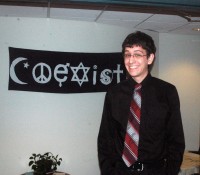Article by: Derek Anderson
Suffolk junior Nathaniel Steinsultz was recently awarded the prestigious Barry M. Goldwater Award for Math, Science and Engineering, a scholarship that top students apply for from universities all over America. The scholarship, which, according to the Goldwater Scholarship website “covers eligible expenses for undergraduate tuition, fees, books, and room and board, up to a maximum of $7,500 annually” has been awarded to Steinsultz for his excellence in the area of physics.
“The Goldwater Award for Mathematics, Science and Engineering recognizes the top 300 students in U.S. colleges and universities,” said Physics Department Chair Walter Johnson in a press release, who serves as the University’s liaison to the Goldwater Scholarship committee.
Steinsultz said the process of applying for the award took a few essays describing his past research and interests in graduate school. “I had to write essays about why I wanted to go to grad school and the research I’ve done. I had to write an essay summarizing a current area of research I was interested in, what was being done in that field and something I had worked on in that field,” said Steinsultz.
With the award won from his studies and hard work, Steinsultz is faced with the decision of where he wants to go next. “Like most students, I’m unsure of what I’m doing up next even though it’s coming up fast. I know I want to apply to grad school,” he said. “That’s something I’m going to be looking at significantly more seriously within the next few months. I haven’t really sat down and dug through the programs and found exactly what I want to apply to.”
Steinsultz said he is most interested in nanoscience and nanotechnology. “Right now I’m interested in doing [nanotechnology]. I’ve been interested in the project I’ve been working on,” said Steinsultz. “I’m doing an internship this summer at MIT in material science, so hopefully I’ll get to do some nanotech related stuff with that.”
Steinsultz’s current research has, in short, been on genetically modifying bacterial phages so that they can bind to metals. When this binding occurs, it creates a type of wire substance. “The appeal of that is that you can basically grow batteries in vats,” said Steinsultz. “They’d also be more susceptible to biodegradation because they are organic materials, so they would be easier to recycle. We’re investigating the potential of that. I think that nanoscience and nanotechnology will be at the forefront of new technology that’s going to come out during our lifetime, over the next 50 years. Some of the stuff that will come out of there will be amazing.”
Regardless of Steinsultz’s next move, the University is swelling with pride in his accomplishments. “I am so pleased that Nat Steinsultz is one of this year’s winners. In Physics, we have some incredibly bright, talented students but occasionally one comes along who is off the scale like Nat,” said Johnson. “It is a great honor for him, the Physics Department, and the College of Arts and Sciences.”
With the Goldwater Award and his upcoming internship at MIT under his belt, Steinsultz says he is excited for what’s next. He said he was also surprised he walked away with such a big award. “I was definitely surprised. It’s a pretty big award since it’s with all the best students at all these different universities,” said Steinsultz. “I was pretty excited. I’m mostly glad that Suffolk, particularly the Physics Department, is getting recognized on a national level for the work they’re doing here. It’s a pretty small, relatively unknown department. Even at Suffolk nobody really knows what the Physics Department is doing or where they are or who they are, so I think that’s pretty cool.”













